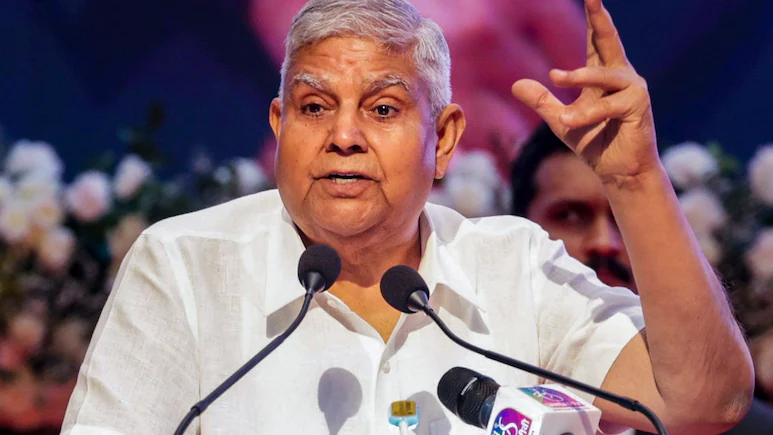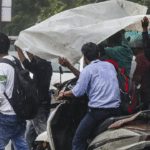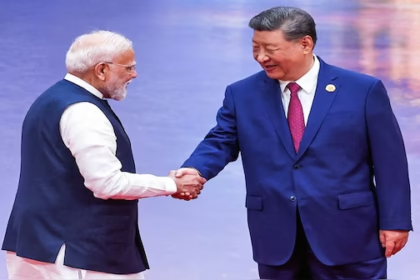The Making of Jagdeep Dhankhar — From Rural Roots to National Relevance
In the intricate web of Indian politics, where party lines often blur and ideological positions shift with time, few figures have managed to maintain both a strong regional identity and an assertive national presence. Jagdeep Dhankhar, currently serving as the Vice President of India, is one such figure whose journey has traversed the quiet farmlands of Rajasthan to the intense corridors of constitutional power in New Delhi. His political trajectory has not only been shaped by persistent advocacy for farmers’ rights and federal balance but has also sparked fierce debates — sometimes even involving India’s strategic posture, such as the controversial “nuclear missile” comment.
This article seeks to examine the major political clashes and constitutional confrontations that define Dhankhar’s public life. From his early days representing agrarian causes to his tenure as Governor of West Bengal and now Vice President of India, each role has been marked by confrontation — not for the sake of conflict, but out of what he often frames as his duty to uphold constitutional propriety.
The Early Years: Legal Acumen Meets Grassroots Sensibility
Born into a modest Jat farming family in Kithana village of Jhunjhunu district, Rajasthan, Jagdeep Dhankhar’s early life was rooted in the challenges of rural India. These formative years shaped his understanding of agricultural and rural distress, leaving an indelible mark on his political philosophy. His academic excellence led him to pursue law, eventually practicing at the Rajasthan High Court and the Supreme Court of India.
By the early 1990s, Dhankhar had entered politics via the Janata Dal and soon shifted to the Congress and then the Bharatiya Janata Party (BJP). His ideological flexibility, often questioned by his critics, was for him more a strategic adaptation than inconsistency. His background as a lawyer helped him navigate complex policy debates, especially those relating to constitutional boundaries and federalism.
First Public Confrontation: The Farmers’ Voice in Parliament
During his initial tenure as a Member of Parliament in the Lok Sabha from Jhunjhunu, Dhankhar made headlines for his vocal defense of farmers. This wasn’t mere lip service. Unlike many politicians who invoked rural India only during elections, Dhankhar frequently pushed for concrete policy discussions on Minimum Support Price (MSP), irrigation reform, and land acquisition laws. He was particularly active during debates on liberalization in the early ’90s, where he warned against the marginalization of small farmers amidst economic reforms.
Though not always successful in pushing through legislative victories, Dhankhar developed a reputation for being an articulate, if combative, parliamentarian. His passion for agrarian issues earned him bipartisan respect, even as his rhetorical style sometimes invited censure from senior leadership.
The West Bengal Governorship: A Constitutional Crisis in Motion
Perhaps the most defining and controversial chapter of Jagdeep Dhankhar’s political life came during his tenure as Governor of West Bengal (2019–2022). Rarely in recent memory has a constitutional head clashed so repeatedly and publicly with a state government. His ongoing sparring matches with Chief Minister Mamata Banerjee and her Trinamool Congress (TMC) administration became a permanent feature of West Bengal politics.
From questioning the legality of university appointments to objecting to state legislation and accusing the government of undermining constitutional institutions, Dhankhar positioned himself as a watchdog rather than a ceremonial figurehead. This triggered an ongoing constitutional debate across India: Where does the governor’s role end and the elected government’s authority begin?
While his critics accused him of overreach and partisan behavior, Dhankhar defended his conduct as a response to the alleged erosion of democratic norms in the state. His insistence on transparency and procedural correctness often led to bitter exchanges, public letters, and even legal threats.
The ‘Nuclear Missile’ Comment: A National Headline
In 2023, Jagdeep Dhankhar made a remark that set the national discourse ablaze: likening constitutional power to a “nuclear missile” that should be used sparingly but decisively. While the metaphor was intended to illustrate the potential strength of constitutional roles like that of the Vice President and Rajya Sabha Chairperson, it was criticized for being tone-deaf and alarmist.
Critics interpreted it as a dangerous parallel that could signal authoritarian overreach or imply the use of power beyond procedural bounds. Supporters, however, saw it as a reinforcement of the idea that constitutional positions are not merely ceremonial but are empowered to act when the system is in peril.
Regardless of interpretation, the statement underscored Dhankhar’s style: assertive, unapologetic, and deliberately provocative when defending the sanctity of institutions.
A Voice That Disrupts and Defends
In Part 1 of this long-form exploration, we have traced Jagdeep Dhankhar’s political evolution from rural Rajasthan to the upper echelons of constitutional authority. Whether one sees him as a principled defender of federal integrity or a disruptive force misusing his position, his impact on contemporary Indian politics is undeniable.
His life story is not just about personal ambition but about institutional tension — between elected power and constitutional balance, between political convenience and legal accountability. The next section of this article will delve deeper into his tenure as Rajya Sabha Chairperson, his role during controversial bills, and his vision for India’s parliamentary democracy.
The Gavel and the Grievance
As the Vice President of India, Jagdeep Dhankhar automatically assumed the role of the Chairman of the Rajya Sabha — the Upper House of Parliament. Traditionally seen as a house of deliberation and considered more temperate than the Lok Sabha, the Rajya Sabha has witnessed increasing disruptions in recent years, particularly on issues relating to federalism, minority rights, and economic policies.
Dhankhar’s entry as Chairperson coincided with some of the most volatile parliamentary sessions in recent memory. His tenure has been marked by an aggressive interpretation of procedural rules, a visible impatience with sloganeering, and an open ideological disagreement with what he calls “constitutional nihilism.” While the Constitution gives the Rajya Sabha Chair sweeping powers in maintaining decorum and directing proceedings, Dhankhar’s exercise of these powers has led to accusations of political partiality — and equally, to applause for enforcing discipline.
An Assertive Chair: Reinventing the Role or Overstepping It?
Since taking the Chair, Dhankhar has made it clear he is not interested in being a passive moderator. Early in his term, he stated:
“The Chair is not a mute spectator, nor is it ceremonial. It is a constitutional sentinel.”
From setting time limits on discussions to pulling up Members of Parliament (MPs) for interrupting proceedings or submitting what he deemed “unparliamentary content,” Dhankhar has ruled with what many term judicial-style precision. His supporters argue this is exactly what the Rajya Sabha needed — someone who wouldn’t allow precious hours of taxpayer-funded parliamentary sessions to be wasted on repeated adjournments.
However, opposition leaders have often protested his interpretation of rules, claiming he silences dissent under the guise of procedure. The tensions peaked during debates over controversial bills such as the Data Protection Bill, Uniform Civil Code discussions, and Electoral Bond transparency demands, where opposition voices alleged that legitimate questions were suppressed through procedural filters.
Clashes with Key Opposition Leaders
Dhankhar’s list of parliamentary adversaries includes senior opposition leaders like Mallikarjun Kharge, Derek O’Brien, Jairam Ramesh, and Sanjay Singh. In some sessions, the friction between the Chair and members reached a flashpoint — with walkouts, symbolic protests, and even suspensions.
In one widely publicized incident, Dhankhar refused to admit a motion raised by opposition members under Rule 267 (used to suspend normal business to discuss urgent issues), citing procedural deficiencies. His justification was that Rule 267 was being “weaponized” for political theater rather than genuine national interest.
The backlash was immediate and loud. Several opposition MPs accused him of double standards, citing instances from earlier regimes when Rule 267 was used to raise issues such as the Gujarat riots or demonetization.
Dhankhar’s rebuttal? “This Chair will not permit the desecration of rules in the name of urgency.”
This firm — some say inflexible — stance has polarized the House. Yet it has also elevated the Vice President’s constitutional voice to one of national significance.
Free Speech vs Parliamentary Decorum: Where Does He Draw the Line?
One of the core debates surrounding Dhankhar’s leadership in the Rajya Sabha is the boundary between freedom of speech for elected representatives and the need for parliamentary discipline. Dhankhar, citing constitutional propriety, has rejected or redacted portions of speeches that he believes breach decorum or make unsubstantiated allegations.
For example, during a fiery debate on the Pegasus spyware allegations, when opposition MPs named specific government functionaries, Dhankhar intervened and expunged large portions from the record. His critics alleged censorship. He, however, cited Article 105 and Rajya Sabha Rule Book guidelines, maintaining that unfounded allegations without evidence were not expressions of free speech but violations of constitutional privilege.
Such incidents have reignited debates among constitutional scholars about the evolving role of the Vice President as Rajya Sabha Chair. Is Dhankhar restoring lost discipline? Or is he steering the Rajya Sabha toward executive alignment?
Public Addresses and Ideological Positioning
Unlike some of his predecessors, Jagdeep Dhankhar hasn’t confined himself to the parliamentary premises. He regularly uses public forums, university convocations, constitutional seminars, and legal conferences to articulate his philosophy.
In a keynote address at a law university, Dhankhar famously said:
“If democracy is to flourish, there must be sanctity in the temple of debate. Shouting slogans is not a substitute for scholarship.”
While such statements have earned applause in academic circles and from those frustrated by parliamentary disruptions, they have also been seen as indirect jabs at civil protests and dissent — particularly movements led by students, farmers, and civil society.
It’s evident that Dhankhar sees his role not merely as an administrator of procedure but as a custodian of democratic ethics. He is not afraid to challenge the popular mood — and therein lies both his strength and his risk.
Between the Gavel and the Nation
Jagdeep Dhankhar’s tenure as Vice President and Rajya Sabha Chair has set a new tone in India’s parliamentary discourse. At a time when institutions across the democratic spectrum are under strain, his role in enforcing parliamentary discipline, while controversial, is undeniably impactful.
He embodies a rare mix of legalistic rigor and ideological conviction. Whether history judges him as a constitutional revivalist or a partisan disruptor will depend on how future sessions of Parliament evolve — and whether his methods bring durable reform or deepen political fault lines.
Though largely a constitutional role with limited executive powers, Jagdeep Dhankhar’s vice presidency has extended far beyond ceremonial obligations. With public speeches that resonate across campuses, legal institutions, cultural gatherings, and media platforms, Dhankhar has consistently positioned himself not merely as a presiding officer but as a vocal defender of what he describes as “Bharatiyata” — a rooted, civilizational sense of Indian identity.
This section explores how Dhankhar’s ideological worldview has evolved, how his roots in Bengal’s political turbulence influenced his nationalism, and how his current vision aligns or clashes with India’s shifting political consensus.
The Bengal Crucible: Political Awakening and Strategic Rise
Though born in Rajasthan, Dhankhar’s most pivotal political experiences came from his stint as the Governor of West Bengal from 2019 to 2022 — arguably the most politically turbulent period in the state since the end of Left rule.
His relationship with West Bengal Chief Minister Mamata Banerjee was fractious and often confrontational. The Governor’s Office, traditionally expected to remain above political fray, became a battleground for constitutional interpretation.
From questioning state law and order breakdowns to tweeting pointed remarks at state ministers, Dhankhar transformed the Governor’s role into that of a constitutional watchdog with national attention.
Supporters hailed him as a lone sentinel against what they saw as federal overreach and local majoritarianism; critics accused him of being a mouthpiece for the Centre, undermining federalism.
This phase hardened Dhankhar’s articulation of “constitutional morality”, frequently citing Dr. B.R. Ambedkar while defending the limits of executive authority and judicial independence.
Bharatiyata: Rooted Identity or Ideological Assertion?
One of Dhankhar’s more controversial yet recurring themes in public discourse is his invocation of “Bharatiyata” — roughly translating to Indianness, but laden with civilizational and cultural overtones.
In a 2024 convocation speech at Delhi University, Dhankhar stated:
“Bharatiyata is not parochialism. It is a civilizational consciousness rooted in plurality, tolerance, and dharma. If we abandon it for borrowed ideologies, we risk intellectual slavery.”
Such assertions drew both celebration and scrutiny. Right-wing thinkers embraced the framing as a legitimate rejection of colonial intellectual legacy, especially in academia and judiciary. Liberal scholars, however, warned of the dangers of conflating culture with constitutional governance.
Nevertheless, Dhankhar has consistently argued that modern India must rediscover and assert its native knowledge systems, legal traditions, and philosophical roots — not at the cost of democracy, but to deepen it.
Standing Against Judicial Activism: The Judiciary Controversies
Perhaps Dhankhar’s most significant ideological clashes have come with the judiciary. While his critics accuse him of undermining judicial independence, his interventions have brought key constitutional questions to the national spotlight.
In several speeches and interviews, Dhankhar has questioned:
- The opaque nature of the collegium system for appointing judges.
- The rise of judicial overreach in matters traditionally reserved for the legislature.
- The judiciary’s increasing role in “basic structure doctrine” interpretations.
In one notable address to the Bar Council, he said:
“If a court starts writing laws and Parliament starts interpreting judgments, we have reversed the roles assigned by the Constitution. Such inversion threatens our democracy.”
These remarks prompted swift backlash from retired judges, legal activists, and senior advocates. Yet, many within the legal community also agreed — albeit cautiously — that the accountability vacuum in judicial appointments is real.
His position aligns with the current ruling government’s own discomfort with the collegium system. However, unlike ministers or MPs, Dhankhar’s constitutional role as Vice President gives his words symbolic gravity — a fact that’s both empowering and controversial.
The Global Stage: Soft Power and Civilizational Diplomacy
Jagdeep Dhankhar has also increasingly been featured in India’s soft power projection abroad. In delegations to international forums, university visits, and global academic seminars, he often represents a confident, assertive India.
He has consistently presented India as:
- A civilizational state grounded in tolerance, pluralism, and spiritual democracy.
- A natural leader in the Global South, advocating reform in global institutions like the UN Security Council.
- A cultural lighthouse, offering solutions like Ayurveda, Yoga, and Indic jurisprudence as alternatives to Western-dominated paradigms.
While these positions echo the Modi government’s global outreach, Dhankhar packages them with a blend of legal reasoning and philosophical conviction — a unique flavor missing from most political diplomacy.
The Dhankhar Doctrine? Early Signs of a Larger Role
With his growing visibility, some political observers suggest that Jagdeep Dhankhar is positioning himself for a larger role in India’s political future — possibly as a consensus candidate for even higher office, or as a potential bridge between traditional conservatism and constitutional liberalism.
He is a rare politician who straddles:
- Legal precision and ideological clarity
- Institutional fidelity and public engagement
- Cultural rootedness and global articulation
What he lacks in mass political charisma, he appears to compensate with a lawyer’s argument and a philosopher’s conviction. Whether this can translate into electoral traction remains uncertain. But in an era where narrative framing is political power, Dhankhar has certainly carved his space.
From Regional Contender to Civilizational Messenger
Jagdeep Dhankhar’s evolution — from a regional politician in Rajasthan to Governor of Bengal, from Vice President to a national ideologue — is not just a personal journey. It mirrors India’s own complex transition: from constitutional modernism to cultural revivalism, from procedural democracy to assertive statecraft.
He is not merely a man in office. He is an emerging thought platform — one that challenges, provokes, and often polarizes. But above all, he embodies a version of India that is still defining its balance between tradition and modernity, federalism and unity, rights and responsibilities.
Also Read : Mumbai Rain Alert: 150+ mm Rainfall Expected in 36 Hours, IMD Issues Orange Warning for July 23-24








